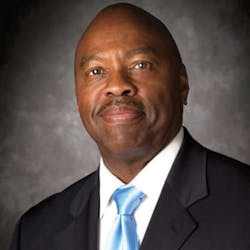Phil Washington set to return to Denver to head up airport
One of the transit industry’s most respected leaders will be returning to a city he calls home. Phil Washington has been appointed to be the CEO of Denver International Airport following the retirement of current CEO Kim Day. The appointment requires the approval of Denver City Council and Washington could begin in his new role in July.
“Given the important role the airport must play in our post-pandemic recovery, and with the departure of Kim, our airport needs a leader who can step into this space and hit the ground running without missing a beat,” said Denver Mayor Michael Hancock. “We have found that leader, and today I'm proud to announce I am nominating Phil Washington to be the next CEO of Denver International Airport, and to welcome him back to Denver.”
Washington served as the assistant general manager and general manager and CEO of Regional Transportation District of Denver between 2000 to 2015 before joining Los Angeles County Metropolitan Transportation Authority (L.A. Metro) as CEO.
“I’m honored to be nominated for this role by Mayor Hancock, and excited to have the opportunity not only to return home, but to lead one of the premier airports and airport teams anywhere in the world,” Washington said.
As L.A. Metro’s CEO, Washington managed a balanced budget in excess of $8 billion a year, was responsible for overseeing between $18- $20 billion in capital projects and provided oversight of an agency with 11,000 employees that transports 1.2 million boarding passengers daily on a fleet of 2,200 clean-air buses and six rail lines.
Under Washington’s leadership, Los Angeles passed Measure M in 2016 with 71.15 percent voter approval, one of the largest local transportation funding efforts in American history. During his time with L.A. Metro, Washington was also engaged in all facets of transportation and infrastructure in L.A. County, including aviation, goods movement, freight/railroads, water, public works, housing and Transit-Oriented communities (TOCs).
“Phil Washington is this country's finest transportation professional. We wanted him to lead L.A. Metro because he had led the most innovative and largest construction program in the country the last time he worked in Denver, and it's only fair that Denver gets to benefit from his excellence once again,” said Los Angeles Mayor Eric Garcetti. “In L.A., Phil oversaw the largest infrastructure program in the United States and pioneered groundbreaking initiatives to address climate change, increase economic opportunity and expand free transit. I've always known the sky's the limit with Phil, and Denver International Airport will be in the hands of a proven leader and powerful innovator in Phil Washington.”
During his time in leadership at Denver RTD, Washington led and implemented the FasTracks program, one of the largest voter-approved transportation expansion programs in the country at the time. Under his leadership, Denver’s West Corridor Rail Line project was completed under budget and eight months earlier than scheduled, and the award-winning Denver Union Station project was completed five months early and has become the vibrant hub of Denver’s lower downtown neighborhood. Washington also implemented the nation’s first and only $2.2 billion transit public-private partnership (P3), resulting in the University of Colorado A Line, which opened in 2016.
As CEO of Denver International Airport, Washington will manage the third-busiest airport in the U.S. and one of the top 10 busiest airports in the world. With 69 million passengers traveling through the airport in 2019, the city’s airport is one of the busiest airline hubs in the world’s largest aviation market. The city explains the airport is the primary economic engine for the state of Colorado, generating more than $33.5 billion for the region annually. Additionally, it has become one the largest domestic networks, growing from 170 nonstop destinations in 2018 to 214 in 2019, including international cities such as Tokyo, Paris, Zurich, Reykjavik and Panama.
About the Author
Mass Transit Staff Report
Stories under this byline were produced through a team effort by the editorial staff of Mass Transit.
To learn more about our team, click here.
If you have a story idea, let us know by emailing [email protected]. Please review our contributor guidelines found here.
